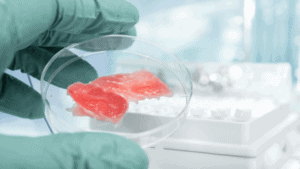For this feature we are very pleased to welcome a special guest contributor, one who is extremely well-respected in our vegan world and will be well-known to most of our readers. Olivia Fox Cabane is the founder & CEO of The Global Alternative Food Awards (GAFAs), lecturer on innovation and leadership at Stanford, Yale, Harvard and MIT, and best-selling author of books which have been translated into over 30 languages.
Here, Ms Fox Cabane discusses the future of dairy and meat, offering her privileged insight into these fast-moving industries. Next week vegconomist will publish a special two-part feature regarding her breakthrough work producing “landscapes” which depict the most current and upcoming companies in alternative proteins, plant-based dairy, algae and fungi.
Meat & Dairy: The Kodak Moment, Olivia Fox Cabane
Many observers are recognizing the dairy & meat industries’ “Kodak moment.” Did you know digital photography was actually created inside Kodak, by a Kodak employee? But Kodak’s business model was similar to that of razor companies: make money selling the film, not the camera. To them, digital photography was an existential challenge. Instead of recognizing this challenge, adapting to it or even embracing it, the company refused to change with the times, and so the times changed without it. Kodak filed for bankruptcy in 2012.
The biggest meat companies have clearly seen this situation coming and most are being proactive, reinventing themselves as ‘protein’ companies and investing in alternative protein. In fact, Tyson Foods was until recently one of the largest funders of bioengineered meat startup Memphis Meats, and are now bringing out their own line of plant-based meat. Cargill sold off the last of their feedlots two years ago, and like many other big meat companies now call themselves ‘protein’ companies.
The decline of dairy milk

The dairy industry, on the other hand, is in a more reactive position and so far, despite the dramatic decline leading to bankruptcies in areas such as the USA’s Midwest, few dairy farms have been willing to consider transitioning from animal milk to plant milk.[1]
This is unfortunate because those that have, such as Elmhurst Dairy, have experienced considerable success, and at least two separate task forces – the Farm Transformation Initiative and the Dairy Farmers Task Force – were established specifically to help struggling farmers gain access to more lucrative markets.
I believe there will always be a niche market for high-end or specialized animal products, just as there is a market for top-quality film for both amateur and pro photographers.
Technology wins…
The day when alternative protein foods becomes cheaper than their traditional counterparts is inevitable. The day they match taste and texture too, it’s game over. As we say in Silicon Valley, every time technology challenges an established industry, technology wins.
China is, right now, experiencing a virulent African Swine Flu epidemic which has already killed over a million pigs, and isn’t showing any signs of slowing down. The Chinese government has already expressed its desire to reduce meat consumption by 50% in 2050.
Whether or not this goal is achievable, imagine what would happen if they decided to focus on making 3D printers affordable. Is there any country in the world that is better at cheap manufacturing? China could become world leader in 3D food manufacturing, hastening the day when the food printer is as commonplace as the microwave.
The generational divide

When asked, “But will people ever accept lab-grown, test-tube, fake meat?” My answer is: ‘When did you last hear someone use the phrase “test-tube baby”?’ These days, IVF (in-vitro fertilization) is so commonplace that no-one would think of calling people born this way ‘lab-grown, test-tube, fake humans.’
But the greatest divide seems generational to me. Millennials and those younger seem quite comfortable with the idea of meat grown in a lab (after all, many of them were started this way.)
This is part of the reason why Big Food is so keen on this space — see the dizzying rate of investments in alternative protein companies. Algae companies in particular are highly sought-after, perhaps because the bioavailability of algae protein is far higher than almost any other foods. Spirulina for instance has around a 70% rate.
[1] When I mentioned the idea at SXSW to Wisconsin Dairy representatives, they burst out laughing and said “yeah, right. I don’t think so.”
Olivia Fox Cabane is the cofounder of kindearth.tech and organizer of the upcoming Alternative Protein Summit in Amsterdam, August 26-28.





